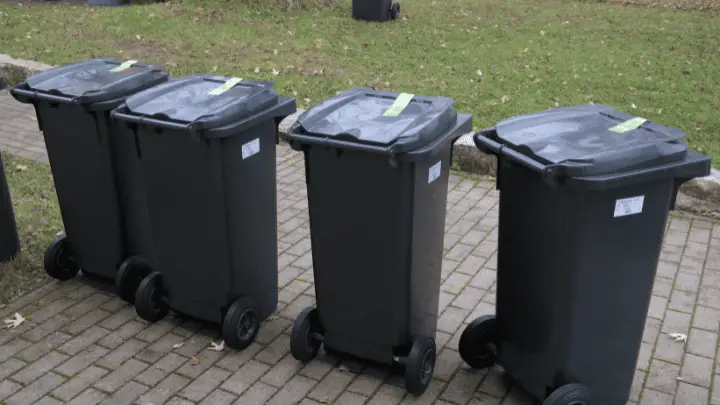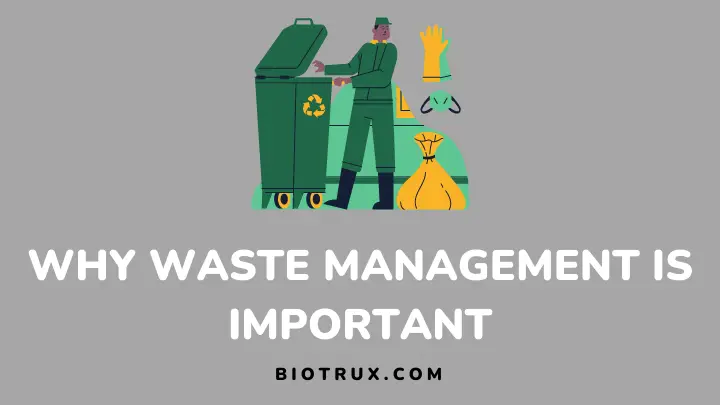Waste management is a crucial aspect of our daily lives that is often overlooked. Proper waste management is essential not only for our health and well-being but also for the environment.
With the ever-increasing population and industrialization, waste management has become more important. In this article, you will explore why waste management is vital and how it can benefit us in the long run.
From reducing pollution to conserving natural resources, waste management is crucial in maintaining a sustainable future for ourselves and future generations.
Let’s get started.
1. Public Health and Safety
One of the most crucial reasons why waste management is important is for public health and safety. Improper waste disposal can lead to various health hazards and risks. When waste is not properly managed, it can contaminate soil, water, and air, spreading diseases and infections.
For instance, when hazardous waste is not disposed of properly, it can leak toxic substances into the environment. This can lead to serious health consequences for individuals living in the surrounding areas.
Similarly, if solid waste is left untreated, it can attract pests and vermin, creating a breeding ground for diseases and causing a threat to public health. Effective waste management strategies can help protect the health and safety of the public by mitigating the risks of diseases, pollution, and environmental harm.
Therefore, individuals, communities, and governments need to prioritize waste management to ensure a clean and healthy environment for everyone.
2. Environmental Protection and Preservation
Waste management plays a crucial role in environmental protection and preservation. Improper waste disposal can lead to various negative impacts on our surroundings. It can contaminate soil, water, and air, causing harm to wildlife and ecosystems.
By practicing effective waste disposal, such as recycling and proper disposal, we can reduce pollution, conserve natural resources, and protect the environment for future generations.
Prioritizing sustainable practices ensures a cleaner, healthier, and more sustainable planet.
3. Recycling
This is another crucial aspect of waste management because it helps reduce the amount of trash in landfills or pollutes the environment. Recycling paper, plastic, glass, and metal can conserve natural resources, reduce greenhouse gas emissions, and save energy.
Recycling also reduces the need for new raw materials and conserves natural resources, preventing the pollution and destruction of ecosystems.
Individuals and communities must participate in recycling programs to ensure a healthier and cleaner environment for future generations.
4. Economic Benefits and Job Creation
Waste disposal is crucial for maintaining a clean and healthy environment and provides significant economic benefits and job creation opportunities.
Proper management practices, such as recycling and treatment, require specialized facilities and infrastructure, creating job opportunities in the environmental sector.
Moreover, recycling and waste treatment also contribute to creating new products and materials, boosting economic growth and promoting a circular economy.
Communities can see positive impacts on their economy and environment through sustainable resource management practices.
5. Energy Production
Waste management plays a crucial role in energy production. Waste can be converted into valuable energy sources and properly managed through recycling and other sustainable methods.
For example, organic waste can be processed through anaerobic digestion to produce biogas, which can then be used to generate heat and electricity. This reduces the dependence on fossil fuels and promotes a cleaner and more sustainable energy production process.
In addition, waste-to-energy plants can convert non-recyclable waste into electricity, further contributing to the energy grid. By prioritizing waste management, we can harness the potential energy within our garbage and minimize our environmental impact.
6. Resource Conservation and Sustainability
One of the main reasons why waste management is important is because it contributes to resource conservation and sustainability.
Proper waste management practices involve recycling and reusing materials whenever possible. By doing so, we can reduce the demand for raw materials, conserve natural resources, and minimize the amount of waste in landfills or incinerators.
7. Aesthetics and Tourism
Waste management is crucial for maintaining the aesthetics and appeal of a city, especially in terms of tourism. No one wants to visit a destination plagued with litter and garbage.
Effective waste disposal ensures that streets, parks, and public spaces are clean and free from unsightly trash, enhancing a city’s overall beauty and attractiveness. This not only pleases tourists but also creates a positive image, encouraging more visitors and boosting the local economy.
By prioritizing trash management, cities can preserve their natural landscapes and cultural heritage, making them more desirable tourist destinations.
8. Compliance With Regulations
Compliance with regulations is another crucial aspect of waste management. Strict rules and regulations are in place to ensure the proper disposal and handling of waste materials.
Failure to comply with these regulations can result in hefty fines and legal consequences. It is essential to prioritize compliance to maintain a clean and sustainable environment for future generations.
9. Climate Change Mitigation
Climate change mitigation is a pressing global issue, and waste management is crucial. Improper waste disposal methods release greenhouse gases, such as methane, which significantly contribute to the potential effects of climate change.
Implementing effective waste management strategies, such as recycling, composting, and proper landfill practices, can reduce these emissions and help mitigate climate change.
By diverting waste from landfills and adopting more sustainable practices, we can minimize our carbon footprint and work towards a cleaner and greener future. Proper trash management is essential for achieving climate change mitigation goals.
10. Future sustainability
One of the key reasons why waste management is important is because it ensures future sustainability.
Proper waste management practices help to conserve resources and minimize environmental impact. By properly managing waste, we can prevent the depletion of natural resources, reduce pollution, and protect the health of our ecosystems.
By implementing effective trash management strategies today, we can create a more sustainable future for future generations. Our responsibility is to make conscious choices about how we dispose of our waste to preserve our planet for future generations.

FAQs
What are the consequences of improper waste disposal?
Improper waste disposal can lead to water and soil contamination, air pollution, health hazards, and harm to wildlife, causing severe environmental and public health issues.
How does waste management contribute to sustainability?
It contributes to sustainability by recycling materials, conserving natural resources, reducing energy consumption, and minimizing greenhouse gas emissions.
What economic benefits does waste management offer?
It creates jobs in recycling and processing facilities, saves money and energy through recycling, and reduces healthcare costs related to pollution-related illnesses.
How can individuals contribute to waste management?
Individuals can contribute by reducing waste, recycling, composting organic materials, and supporting sustainable initiatives.
Summary
In conclusion, waste management is an important aspect of our daily lives that we cannot afford to ignore. The improper disposal of waste can lead to serious environmental and health hazards, and our collective responsibility is to ensure we properly manage our waste.
Effective waste management practices help conserve natural resources, reduce pollution, and promote a cleaner and healthier environment. It also offers numerous economic benefits, such as the creation of job opportunities, the generation of renewable energy, and the reduction of disposal costs.
By adopting sustainable practices, we can create a more circular economy that promotes resource conservation, reduces waste, and minimizes negative environmental impacts.
In summary, proper waste management is crucial for the health and well-being of our planet and its inhabitants. Let us all take responsibility for our waste and work together to create a cleaner, healthier, and more sustainable world.
You can also learn more about wood waste management.
Thank you for reading. I hope this information was helpful.

